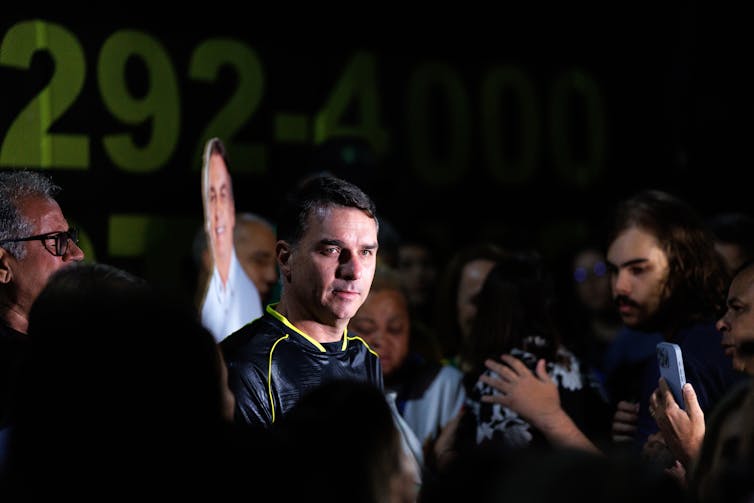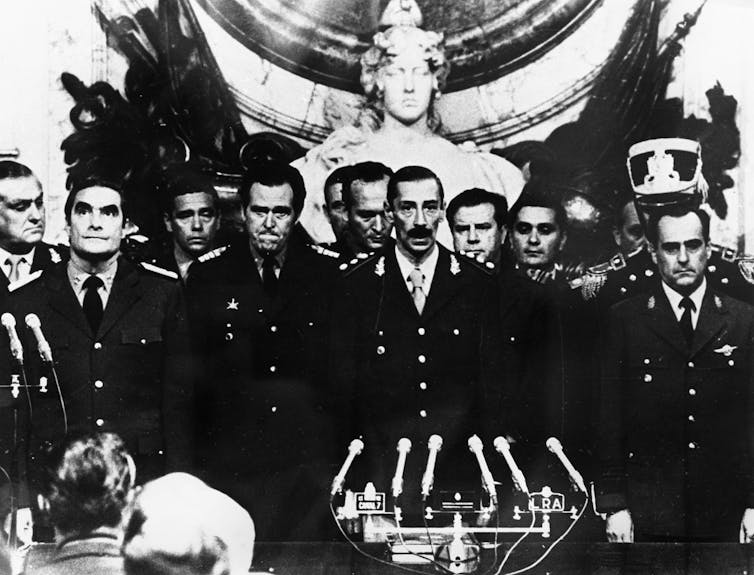- Home
Edition
Africa Australia Brasil Canada Canada (français) España Europe France Global Indonesia New Zealand United Kingdom United States Edition:
Global
Edition:
Global
- Africa
- Australia
- Brasil
- Canada
- Canada (français)
- España
- Europe
- France
- Indonesia
- New Zealand
- United Kingdom
- United States
 Academic rigour, journalistic flair
Academic rigour, journalistic flair
 Jair Bolsonaro was sentenced to 27 years in September for a failed coup.
Andre Borges / EPA
Jair Bolsonaro arrested amid fears he planned to flee as coup trial nears conclusion
Published: November 24, 2025 5.20pm GMT
Felipe Tirado, King's College London
Jair Bolsonaro was sentenced to 27 years in September for a failed coup.
Andre Borges / EPA
Jair Bolsonaro arrested amid fears he planned to flee as coup trial nears conclusion
Published: November 24, 2025 5.20pm GMT
Felipe Tirado, King's College London
Author
-
 Felipe Tirado
Felipe Tirado
PhD Candidate in Law, King's College London
Disclosure statement
Felipe Tirado receives funding from the Centre for Doctoral Studies - King's College London.
Partners
King's College London provides funding as a member of The Conversation UK.
View all partners
DOI
https://doi.org/10.64628/AB.tqfny77st
https://theconversation.com/jair-bolsonaro-arrested-amid-fears-he-planned-to-flee-as-coup-trial-nears-conclusion-269554 https://theconversation.com/jair-bolsonaro-arrested-amid-fears-he-planned-to-flee-as-coup-trial-nears-conclusion-269554 Link copied Share articleShare article
Copy link Email Bluesky Facebook WhatsApp Messenger LinkedIn X (Twitter)Print article
Brazil’s former president, Jair Bolsonaro, was taken into custody on November 22 after it was determined there was a “high risk” of him attempting to flee to a foreign embassy. The arrest took place as the Brazilian supreme court was analysing Bolsonaro’s final appeal against a 27-year prison sentence for leading a coup plot after losing the 2022 election.
Bolsonaro was arrested after he broke his ankle monitor. This happened right after his son, Senator Flávio Bolsonaro, called for a vigil outside the former president’s house. The supreme court justice, Alexandre de Moraes, said Bolsonaro’s escape would have been “facilitated by the confusion caused by the demonstration called by his son”.
Federal agents took Bolsonaro to a police facility in the Brazilian capital of Brasília ahead of a custody hearing. He was subsequently taken to the Papuda prison complex, also in Brasília, where he is expected to begin serving his sentence. Bolsonaro’s sons, allies and lawyers said he wasn’t trying to flee.
Ahead of the ankle monitor incident, Bolsonaro’s lawyers had requested that he serve his sentence at home. They cited his health issues and mentioned that the supreme court had recently granted this benefit to another of Brazil’s former presidents, Fernando Collor, who was convicted of corruption earlier in 2025. The court rejected this request.
 Bolsonaro’s senator son, Flávio Bolsonaro, participates in a vigil near the former Brazilian president’s home in Brasília on November 22.
Isaac Fontana / EPA
Bolsonaro’s senator son, Flávio Bolsonaro, participates in a vigil near the former Brazilian president’s home in Brasília on November 22.
Isaac Fontana / EPA
The coup plot was first discovered during investigations into an insurrection in Brasília in January 2023, where thousands of Bolsonaro supporters stormed the heart of the Brazilian government. Investigators uncovered evidence that the riot was part of an attempted coup.
They subsequently found that the plot also included a plan to assassinate Brazil’s current president, Luiz Inácio Lula da Silva, as well as his vice-president, Geraldo Alckmin, and Justice Moraes. Bolsonaro and several other high-ranking officials were indicted for their involvement in the plot in early 2025, with convictions handed down in September.
Those convicted alongside Bolsonaro include Colonel Mauro Cid, army generals Walter Braga Netto, Augusto Heleno and Paulo Sérgio Nogueira, and former navy commander Almir Garnier Santos. Also convicted were former justice minister Anderson Torres and former intelligence agency director Alexandre Ramagem.
Brazil’s supreme court ordered the arrest of Ramagem on November 21. He fled Brazil in September and has been living in the US since then. Ramagem’s lawyers and political allies informed the press that they did not know he had left the country.
Bolsonaro received the longest sentence of the eight main conspirators. The sentences handed out to Netto, Heleno, Nogueira, Garnier Santos, Torres and Ramagem range from 16 to over 26 years in prison. Cid, who was Bolsonaro’s former main military aide, will serve a two-year house arrest sentence after cooperating with the investigation.
The sentencing and arrest of Bolsonaro and his co-conspirators is a significant moment for Brazil. Never before have members of the country’s political and military elite been held to account for staging a coup.
Supreme court verdict
In total, 34 people have been formally indicted in connection with the coup plot. The supreme court has accepted all but one of these criminal complaints. It still has to analyse the charges against prominent right-wing influencer Paulo Figueiredo, who has not not yet presented his defence. Figueiredo is the grandson of Brazil’s last dictator, João Figueiredo, and lives in the US.
In October, the supreme court panel responsible for the case convicted seven other defendants for their roles in the coup plot. These people were accused of running a disinformation campaign to spread fake news about the 2022 election and attacking Brazil’s state institutions. Their sentences range from seven to 17 years in prison.
Those convicted were former army officers Ailton Barros, Ângelo Denicoli, Giancarlo Rodrigues, Guilherme Almeida and Reginaldo Abreu, as well as federal police agent Marcelo Bormevet. Carlos Moretzsohn Rocha, who was accused of drafting the report used to challenge the 2022 election results, was also sentenced to prison.
More recently, on November 18, the panel convicted nine of ten defendants who were accused of planning the plot’s violent actions. These actions involved the plans to assassinate Lula, Alckmin and Moraes.
One of these defendants, an army general called Estevam Theophilo, was acquitted due to a lack of evidence. And two others, colonels Márcio Resende and Ronald Araújo, may benefit from non-prosecution agreements. The sentences of the other seven range from 16 to 24 years in prison.
The panel is set to judge six other defendants in December who are accused of planning and coordinating other aspects of the plot.
Reckoning with the past
Over the past few decades, some Latin American countries have held their former leaders accountable for crimes committed while in office. Argentina pioneered this trend in 1985 with the so-called “trial of the juntas”.
This trial ended with the conviction of former dictators Jorge Rafael Videla, Roberto Eduardo Viola and Leopoldo Galtieri, as well as other leading figures of the military regime of 1976 to 1983 for crimes against humanity. Argentina’s last dictator, Reynaldo Bignone, has also been convicted multiple times for such crimes since 2010.
 Argentinian military leaders during their swearing-in ceremony in Buenos Aires in 1976.
Prensa Latina / EP
Argentinian military leaders during their swearing-in ceremony in Buenos Aires in 1976.
Prensa Latina / EP
Elsewhere in the region, Uruguayan courts convicted Gregorio Álvarez for crimes against humanity in 2007. Álvarez was the last president of Uruguay’s dictatorship, ruling from 1981 until 1985. Former Peruvian leader Alberto Fujimori was also convicted for human rights violations while in office in 2009.
However, coup plotters and former dictators have generally remained unpunished for their crimes in most Latin American countries. Perhaps the most prominent example is Augusto Pinochet, who was never held to account for his brutal dictatorship in Chile.
Pinochet was arrested in London in 1998 on an international warrant for his alleged role in human rights abuses, but was released on medical grounds before facing trial. Once back in Chile, further charges against him were also blocked by the country’s courts.
The arrest of Bolsonaro represents a long overdue reckoning with Brazil’s authoritarian past and another step in Latin America’s progress towards accountability.
- Brazil
- South America
- Brazilian politics
- Jair Bolsonaro
- Coups
- Give me perspective
Events
Jobs
-
 Analyst, Student Information and Regulatory Reporting
Analyst, Student Information and Regulatory Reporting
-
 Lecturer in Paramedicine
Lecturer in Paramedicine
-
 Associate Lecturer, Social Work
Associate Lecturer, Social Work
-
 Lecturer, Communication Design
Lecturer, Communication Design
-
 Leading Research Centre Coordinator
Leading Research Centre Coordinator
- Editorial Policies
- Community standards
- Republishing guidelines
- Analytics
- Our feeds
- Get newsletter
- Who we are
- Our charter
- Our team
- Partners and funders
- Resource for media
- Contact us
-
-
-
-
Copyright © 2010–2025, The Conversation

 Analyst, Student Information and Regulatory Reporting
Analyst, Student Information and Regulatory Reporting
 Lecturer in Paramedicine
Lecturer in Paramedicine
 Associate Lecturer, Social Work
Associate Lecturer, Social Work
 Lecturer, Communication Design
Lecturer, Communication Design
 Leading Research Centre Coordinator
Leading Research Centre Coordinator

